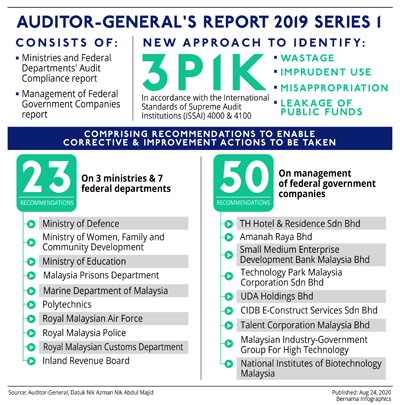 PUTRAJAYA: The process governing the Auditor-General’s Report 2019 has been simplified and made quicker compared to the audit reports of previous years, and this has enabled non-compliance issues and audited entity losses to be detected promptly, Auditor-General Datuk Nik Azman Nik Abdul Majid said.
PUTRAJAYA: The process governing the Auditor-General’s Report 2019 has been simplified and made quicker compared to the audit reports of previous years, and this has enabled non-compliance issues and audited entity losses to be detected promptly, Auditor-General Datuk Nik Azman Nik Abdul Majid said.
“When reported quickly, dubious payments can be stopped as the contract is still in effect, compared to contracts that expired in which we then have to bring the case to court and that usually takes a long time to conclude,” he said at the media conference in conjunction with the tabling of the AG’s report in the Dewan Rakyat yesterday.
For the 2019 report, compliance audit was carried out on three ministries and seven departments while for AG’s Report 2019 Series 1, nine audits were done on federal government companies.
Nik Azman said there were 23 recommendations to assist ministries and federal departments, and 50 more recommendations on federal government companies to rectify identified weaknesses.
Nik Azman said the National Audit Department (NAD) will propose a Special Task Force to conduct reviews on ministries and departments for elements of misappropriation, abuse of power and corruption.
He said these internal checks need to be done via the Public Service Department, while cheating and corruption cases will be handed over to the police and Malaysian Anti-Corruption Commission (MACC) for further investigations.
He said an Auditor-General’s Report Action Committee meeting will be called if there is a breach of regulations to identify issues and for corrective action. Citing findings on the audit done over the Royal Malaysian Navy’s procurement of the Littoral Combatant Ship (LCS), he said liquidated damages totalling RM116.54 million can still be collected over the company’s 245-day delay in handing over the vessel.
On issues concerning the Prison’s Department, such as services and supply not done in accordance to contract requirements, and selection of unqualified suppliers and contractors, Nik Azman said these irregularities should be investigated further by the authorities for elements of corruption and misappropriation.
Nik Azman also touched on the audit done on the Royal Malaysia Police (PDRM), which had spent RM3.47 million for the maintenance of two helicopters despite both aircraft not being active for over three years.
In addition to this, he said leakages were also detected after PDRM were found to have overpaid RM105,875 in its monthly helicopter maintenance payments.
“This is because the payment was made at a rate of RM38,500 a month for 19 months although the aircraft had not been active for more than six months,” he said.
He said a 25 percent payment reduction, or RM28,875 a month as stipulated in the contract, should have applied for the maintenance of inactive helicopters.
Nik Azman said in this regard, PDRM must ensure relevant officials conduct detailed checks on the contracts before payments are made.
Nik Azman also touched on the management audit reports of government companies, and cited Talent Corp Malaysia Bhd (TalentCorp) as one that did not meet the objectives of its set up, adding that its level of corporate governance had been unsatisfactory.
The report found that the standard operating procedures practised by TalentCorp, which has been operating without a chief executive officer since June 2018, had not been tabled for approval by its board of directors, besides the fact that it has yet to have an audit committee since it was set up in 2011.
He said the CEO post vacancy had not been filled up after the change of government in 2018.
“This could one reason why the post remained vacant. There was a lot of restructuring involving ministries then. TalentCorp was first placed under the Prime Minister’s Department and subsequently moved to the Human Resources Ministry,” he said. — Bernama
